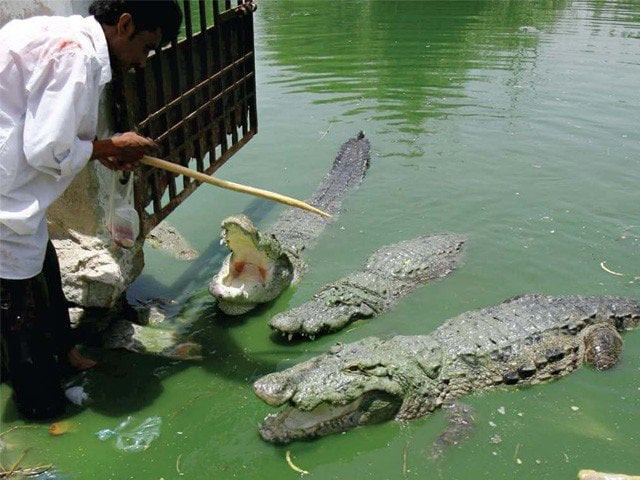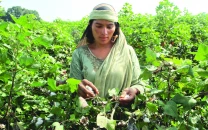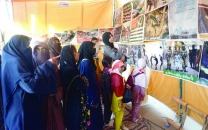Marsh crocodile caught by locals, released into river
Once nearing extinction, population of crocodiles jumped up following recurrent floods

A marsh crocodile was caught by locals in the Kuntani Hor village near Dashat River, north of Jiwani in Balochistan, which was later released into the same river by the authorities.
According to information received in Karachi on Sunday, the locals had tied the reptile to a wooden pole awaiting its release further north.
People, particularly children in the Kuntani Hor village, kept teasing the big reptile, which made it aggressive. However, village elders, demonstrating wisdom, erected an enclosure of thatched mats (chitai) supported with bamboos to prevent direct interference from the crowd.
The village is 20km north of Jiwani town off the Balochistan coast and the Dasht river runs into Jiwani Bay near Iranian border.
Crocodiles are known to inhabit many coastal rivers along the Balochistan coast, including the Hub River, Hingol River, Basul River, and Dasht River.
Very large crocodiles are known from these rivers, and it is not uncommon to see crocodiles measuring four meters or more from nose to tail. Marsh crocodiles scientifically known as Crocodylus palustris are known to be distributed from southern Iran to the Indian subcontinent. Usually, the local community does not disturb these crocodiles along rivers of Sindh and Balochistan, rather these animals are respected and even considered to be of religious importance, like Maggar of Manghopir.
In some rare cases, if they appear near residential areas of the local communities, they are harmed and threatened, but in most cases, these are caught and released at appropriate places. In Dashat River, this mugger crocodile is found downstream of Mirani Dam but seldom reaches near the sea area like Kuntani .According to Muhammad Moazzam Khan, Technical Advisor, WWF-Pakistan, the population of crocodiles is extremely limited in the rivers of Balochistan, the largest population exists in the Hingol and Basul rivers.
A team had been dispatched to Kuntani and approached the Balochistan Wildlife Department to take immediate action for the rescue of this crocodile.
Vulnerable specie
Moazzam further shared that there is a need to create awareness among local communities about protecting the population of crocodiles in Pakistan.
Globally, marsh crocodile is considered to be vulnerable according to the International Union for Conservation of Nature (IUCN) Red List, but the population of crocodiles faces serious threats in Pakistan because of their small size and wide distribution in harsh environments.
The warm-blooded crocodile found in the coastal population of Balochistan was released into the Dasht River. According to Muhammad Moazzam Khan, Technical Advisor to WWF-Pakistan, the efforts of the Balochistan Wildlife Department, the Government of Balochistan, Pakistan Coast Guards, the Assistant Commissioner and Tehsildar of the Jiwani area are commendable. The immediate return of the endangered crocodile to its natural habitat is a commendable step.
According to experts, this species of crocodile is found in freshwater environments such as rivers, lakes, mountain streams, and village ponds. They are also found in coastal brackish water lakes and human-made reservoirs. The crocodile does not migrate seasonally and builds nests on land in various habitats. The maximum length of this species is around 4 to 5 meters, and it can weigh up to 700 kilograms. An adult crocodile's tail is approximately 1.8 meters long. The hatchlings measure around 0.27 meters and weigh less than 0.3 kilograms. They are considered immature until they reach around 1.4 meters in length and weigh between 3 to 30 kilograms. The hatchlings of this species stay in the eggs for about a month. Special temperature and humidity are required for the incubation process. In the coastal areas of Chah Bahar in Iran, there is an estimated population of around 200. Apart from Iran's Sistan and Baluchestan, this species of crocodile is found in the riverine regions of Nepal, Indian Maharashtra, and Gujarat. It is noteworthy that in Pakistan, during the late 1990s and early 2000s, the survival of these crocodiles was severely threatened due to drought. However, after the sea storms and rains in 2007 and 2010, the abundant water resources somewhat normalized conditions for these crocodiles.
Published in The Express Tribune, April 29th, 2024.



















COMMENTS
Comments are moderated and generally will be posted if they are on-topic and not abusive.
For more information, please see our Comments FAQ